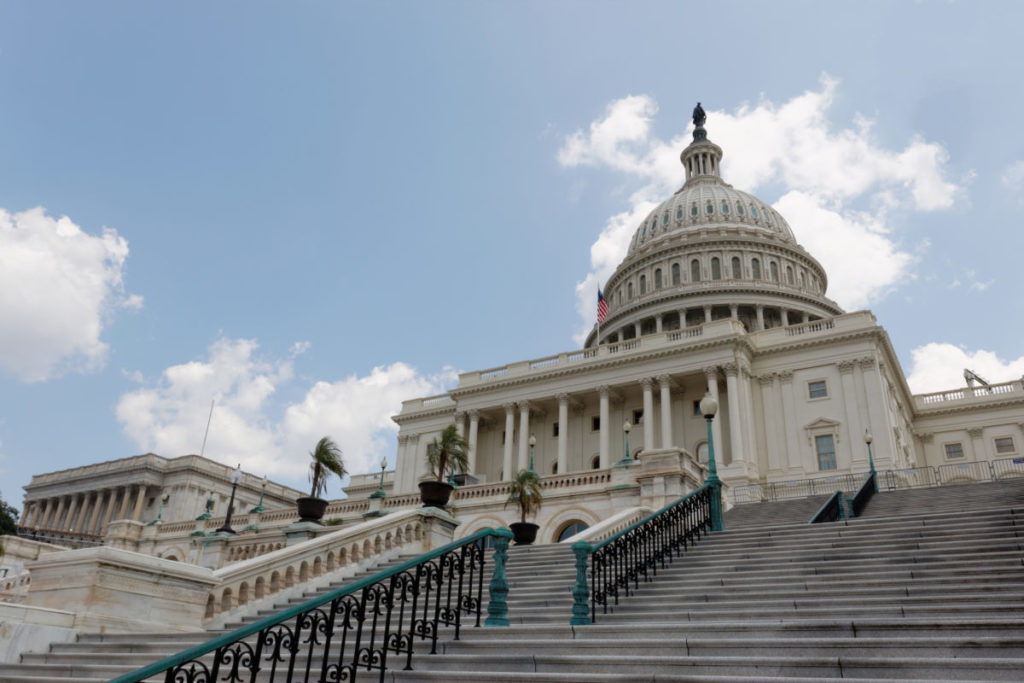This week in the U.S. House of Representatives, Senate: Nov. 14-17, 2016

Congress returns to Washington D.C. this week in the wake of one of the most historic elections in U.S. history for a lame duck session as President-elect Donald Trump prepares his new administration. Here’s what’s happening in Congress this week: U.S. House of Representatives On Monday, the U.S. House of Representatives is in session and will consider several bills under Suspension of the Rules, including: H.R. 1192: National Clinical Care Commission Act; H.R. 1209: Improving Access to Maternity Care Act; H.R. 2713: Title VIII Nursing Workforce Reauthorization Act of 2016; H.R. 4365: Protecting Patient Access to Emergency Medications Act of 2016, as amended; H.R. 985: Concrete Masonry Products Research, Education, and Promotion Act of 2015, as amended; H.R. 4665: Outdoor Recreation Jobs and Economic Impact Act of 2016, as amended; H.R. 2566: Improving Rural Call Quality and Reliability Act of 2016; and H.R. 2669: Anti-Spoofing Act of 2016 On Tuesday, the House is expected to consider additional bills under suspension including: H.R. 5732: Caesar Syria Civilian Protection Act of 2016, as amended; H.R. ___: Iran Sanctions Extension Act. This legislation reauthorizes the 1996 Iran Sanctions Act (ISA) for 10 years, through Dec. 31, 2026. Under the ISA, sanctions may be imposed against foreign companies or entities that invest in the development of Iran’s oil and gas industry. The ISA is due to expire at the end of this year but it is is separate from the multilateral sanctions being lifted under the Iran Nuclear Agreement. H.R. 5332: Women, Peace, and Security Act of 2016, as amended; and H.Res. 780: Urging respect for the constitution of the Democratic Republic of the Congo in the democratic transition of power in 2016, as amended On Wednesday and Thursday, the House is expected to consider the following: H.R. 5711: a bill that would block U.S. financing for Iranian aircraft purchases. The bill, which combines two other bills, prohibits the Export-Import Bank (Ex-Im) from providing any export financing that would benefit the government of Iran or Iranian entities, and it prohibits the Treasury Department from authorizing transactions by U.S. financial institutions to finance the export or re-export of commercial passenger aircraft to Iran. Any prior Treasury authorizations for U.S. financing of commercial aircraft sales to Iran would be retroactively revoked. Alabama co-sponsor(s): None. H.R. 5982: the Midnight Rules Relief Act. The bill permits a new Congress to use the procedures under the Congressional Review Act to disapprove, en bloc, multiple regulations issued by a president in his final year in office, rather than just a single regulation at a time for rules issued during the final 60 session days of the previous Congress. Alabama co-sponsor(s): None. On Friday, the House is not in session. U.S. Senate The Senate is in recess on Monday and will reconvene Tuesday. It is expected to then consider the following: H.R. 4511: the Gold Star Family Voices Act. This bill would allow the Veterans History Project to collect audio and video recordings of biographical histories by immediate family members of service members who died as a result of serving in war.
Martha Roby narrowly wins re-election to fourth Congressional term

Alabama’s 2nd Congressional District re-elected Martha Roby to the U.S. House of Representatives Tuesday. The Montgomery Republican narrowly defeated Democratic challenger Nathan Mathis 46-43 percent. Roby faced a tougher than initially anticipated Election Day following backlash from her October withdrawl of support from Republican Presidential nominee Donald Trump in light of the derogatory comments he made about women over a decade ago. She will return to the House for a fourth term, where she has vowed to keep fighting on the issues that matter to the 2nd District. “I’m grateful for the opportunity to continue serving in Congress and carry on our work on some important priorities,” Roby said following her victory. “Over the last six years, I have fought hard on behalf of this district. I’ve fought on behalf of veterans to expose corruption at the VA and improve care. I’ve fought on behalf of farmers to deliver more sustainable agriculture policy. I’ve even fought my own party leadership when it came to cuts that threatened Maxwell Air Force Base and Fort Rucker. “There’s a lot more fight where that came from, and I’m eager to get back to work.” Though the results of the Presidential election are not yet known, Roby vowed to keep her focus on the issues that matter to Alabamians. Roby continued, “Right now, we don’t know whether conservatives will be playing offense or defense with the White House. No matter who ultimately wins the presidency, my focus will remain working hard to advance conservative values and solve problems on behalf of the people I represent. “One takeaway from this election I want to press with Republican leadership is how so many working people feel marginalized in a country where the outcomes seem predetermined and the deck is stacked against them. Whether it is trade or immigration or tax policy, we need to be communicating how our plans on the issues work to benefit the American worker. We talk a lot about how conservative policies will help the person that owns the factory, but we need to spend more time explaining how they help the men and women working inside it. “I’m eager to carry that message back to Washington.”
Incumbent Gary Palmer defeats challenger David Putman in Alabama’s 6th District

Republican U.S. Rep. Gary Palmer has defeated Democrat David Putman in Alabama’s 6th District. Palmer had 57,642 votes as of 9:30 p.m. CT compared to his opponents’ 17,334. Palmer will continue to represent Jefferson County outside of Birmingham, and the entirety of Bibb, Blount, Chilton, Colbert, Coosa, and Shelby counties in a second term in the U.S. House of Representatives.
GOP battles to limit losses, control House for 2 more years

Republicans seemed on track to secure two more years of House control as the first votes in Tuesday’s elections were counted. But the GOP faced an erosion of its historic majority that could leave hard-line conservatives with added clout to vex party leaders. With Donald Trump rousing opposition in many suburban and ethnically diverse districts, Democrats were hoping to gain a dozen seats or more. Chief targets included GOP incumbents in New Jersey, Virginia, Illinois, Florida, Nevada and California. But both sides anticipated that Democrats would fall short of the 30-seat pickup they’d need to take command of the House for the first time in six years. Democrats have gained that many seats in just five of the 35 elections since World War II, including only once – in 2006 – since the 1970s. In the earliest returns, tea party-backed Rep. Thomas Massie was easily re-elected in Kentucky. One prized pelt for Democrats would be eight-term Rep. Darrell Issa, R-Calif., who dogged President Barack Obama with probes into the 2012 killings of four Americans in Benghazi, Libya, and IRS mistreatment of conservative groups. Another would be Rep. Scott Garrett, R-N.J., from New York City’s suburbs, under fire for reports he’d objected to contributing money for gay GOP congressional candidates. Some Republicans are preparing “to do everything they can to stop progress in Washington,” Obama said in one late radio ad. House Speaker Paul Ryan, R-Wis., was touting his “Better Way” agenda on revamping the tax code and welfare programs and dismantling Obama’s health care law for next year. In a final fundraising email, he called it “our responsibility as conservatives” to maintain GOP House control. Trump’s impact on House races seemed spotty and in some districts was counter-balanced by GOP antipathy to Hillary Clinton, Trump’s Democratic rival for president. Republicans were aiming for Democratic-held seats north of Miami and in northern Minnesota and Omaha, Nebraska, and were strongly defending others that once seemed vulnerable in New York, Iowa and Wisconsin. The GOP’s current 247-188 margin, which includes three vacancies, is a high-water mark for House Republicans since the 270 members they had in 1931. Only several dozen of the chamber’s seats were considered competitive. Both parties’ candidates and outside groups spent nearly $1.1 billion combined on House campaigns, shy of the $1.2 billion record in 2012, according to the Center for Responsive Politics, a nonpartisan research group. Republicans had only a slight financial edge. Since Ryan ascended to the top House job last fall, the chamber has approved measures addressing anti-drug programs, customs law enforcement, financial relief for Puerto Rico and the Zika virus. But even with the GOP’s formidable advantage, work has stalled on spending bills after hitting objections from conservatives, including the roughly 40 members of the hard-right Freedom Caucus. With moderate GOP lawmakers likely among Tuesday’s election losers, dissident Republicans’ leverage will likely grow next year. That suggests tougher problems ahead for GOP leaders, with conservative objections likely over a fresh round of budget legislation plus the need to renew the government’s borrowing authority or face an economy-jarring federal default. A thinner Republican majority could also strengthen conservatives demanding the impeachment of a newly elected President Clinton. Ryan has yet to address that issue directly. Even Ryan, who’s said he wants to be speaker in the new Congress, is not immune to ire from the Freedom Caucus and other Republicans upset over his refusal to campaign for Trump. If the GOP margin is whittled significantly, just a handful of disgruntled conservatives could block Ryan from the 218 votes he’d need to retain his post. That could be an embarrassing setback for the GOP’s 2012 vice presidential candidate, who may harbor future White House aspirations, and some Republicans say it might persuade the 46-year-old Ryan to leave Congress. The year began with Democrats rubbing their hands over the prospects that Trump atop the GOP ticket would produce widespread losses for House Republicans. But many Republicans distanced themselves from Trump and stressed their own issues, with some GOP ads explicitly disavowing him. Other spots linked Democratic hopefuls to Clinton or House Minority Leader Nancy Pelosi, D-Calif. Republished with permission of the Associated Press.
Bradley Byrne calls signing of landmark Colombian peace accord a ‘huge victory’

The Colombian government and the Revolutionary Armed Forces of Colombia, better known as FARC, signed a historic peace agreement Monday, putting an end to a conflict which began in 1964. Alabama 1st District U.S. Congressman Bradley Byrne, a member of the House Armed Services Committee, weighed in on the event, calling it a “huge victory.” “The signing of the peace agreement is a huge victory for the people of Colombia and will allow the healing process to move forward,” said Byrne in a statement. “Colombia is a textbook example of how the United States can help promote peace and democracy through steady and focused diplomacy.” Byrne has been a leading voice in Congress on issues relating to Colombia. He has visited the South American nation to learn more about the economic, military, and diplomatic relationship between the two countries. In July, he delivered a speech from the floor of the U.S. House of Representatives in support of the peace process. “Just because the agreement is signed, our efforts cannot and should not end. The United States must continue to stand with Colombia as they implement the agreement.” The peace agreement will now go before the people of Colombia for a vote of ratification Oct 2.
This week in the U.S. House of Representatives, Senate: Sept. 26-30, 2016

It’s a busy week for both chambers as the federal fiscal year ends on Friday, Sept. 30 and Congress must pass a continuing resolution (CR) or other form of appropriations legislation prior to Oct. 1 in order avert a government shutdown. U.S. House of Representatives The U.S. House of Representatives is scheduled to be in session Monday through Friday this week and expected to recess for the November elections once a CR is enacted. On Monday, the House will consider several bills under Suspension of the Rules. A full list of bills can be found here. On Tuesday, the House will begin consideration of H.R. 5303: the Water Resources Development Act (WRDA). WRDA’s are regular legislation that authorize federal water projects. This WRDA bill authorizes 27 new water projects for construction by the Army Corps of Engineers and authorizes the corps to conduct feasibility studies for 29 possible projects. It also deauthorizes five existing projects and establishes an expedited process for the deauthorization of other projects that are no longer viable. Additionally it modifies the water project selection process created by the 2014 WRDA and other elements of that law. It should be noted that the Senate-passed version (S. 2848) of the bill includes aid to help the city of Flint,MI, respond to lead in its drinking water. Alabama co-sponsor(s): None. The Majority Leader has indicated that additional legislative items are also possible for the balance of the week: FY2017 Continuing Resolution (CR): The House expects to act this week on a stopgap CR to continue funding the government once the new fiscal year begins on Oct. 1. The pending CR is expected to fund the government through Dec. 9, provide emergency funding to respond to the Zika virus, and provide disaster funding to help Louisiana and other states recently devastated by flooding. Alabama co-sponsor(s): N/A JASTA Veto Override: The House may also consider a vote to override the president’s veto of S. 2040: Justice Against State Sponsors of Terror Act, which the president vetoed on Sept. 23. JASTA permits possible lawsuits by U.S. victims of international terrorism against foreign nationals by narrowing the immunity of foreign states and their employees or agents from such lawsuits, and by granting U.S. district courts jurisdiction over certain terrorism-related cases. If enacted, the measure could allow the families of 9/11 victims to sue Saudi citizens for supporting organizations that helped those who conducted the 9/11 attacks. The bill was passed unanimously in the House by voice vote earlier this month. The Senate will act first on the veto. Alabama co-sponsor(s): N/A U.S. Senate This week, the U.S. Senate will continue consideration of a 10-week CR. The pending CR is expected to fund the government through Dec. 9, one week before Congress is currently scheduled to adjourn for the December holidays.
This week in the U.S. House of Representatives, Senate: Sept. 19-23, 2016

The U.S. House of Representatives and U.S. Senate are moving full steam ahead working to finalize negotiations surrounding a Continuing Resolution (CR) to keep the government running beyond the end of September and into December, through the November election. Many lawmakers are hopeful to strike a deal early, which would allow them to recess ahead of schedule and head back to the campaign trail for the pre-election recess that is scheduled to begin Oct. 1. U.S. House of Representatives On Monday, the House meets in pro forma session. On Tuesday, the House is in session and will consider several bills under Suspension of the Rules. A full list of bills can be found here. On Wednesday, the House will consider several more suspensions as well as H.R. 3438: the Require Evaluation before Implementing Executive Wishlists (REVIEW) Act. The bill would delay the effective date of “high-impact” regulations, or those costing more than $1 billion annually, until all court challenges to the regulation have been settled. Alabama co-sponsor(s): Rep. Mo Brooks (AL-05) For the balance of the week, the House is expected to consider the following: H.R. 5461: the Iranian Leadership Asset Transparency Act. The bill requires the Treasury secretary to compile and submit to Congress a report detailing the known assets of Iran’s top political and military leaders, how those assets were acquired, and for what purposes the assets were used. Alabama co-sponsor(s): None H.R. 5931: the Prohibiting Future Ransom Payments to Iran Act. The bill states that it is the policy of the U.S. government not to pay ransom or release prisoners for the purpose of securing the release of U.S. citizens taken hostage abroad, and it generally prohibits the U.S. government from providing to the government of Iran, either directly or indirectly, any cash or other promissory note. It requires the administration to obtain a Treasury foreign assets license before settling any pending financial claims with Iran, and to publicly disclose each such transaction and payment. Alabama co-sponsor(s): None H.R. 5719: the Empowering Employees through Stock Ownership Act. The bill would allow employee stockholders in startup ventures to defer taxes for seven years on stock options in their companies. To qualify, the stock options would have to be offered to at least 80 percent of a company’s workforce, and the benefit would not be available to majority owners, corporate officers, or the highest-paid executives. Alabama co-sponsor(s): None The House may also consider H.R. 1309: the Systemic Risk Designation Improvement Act. The bill would eliminate a $50 billion asset threshold, set by the 2010 Dodd-Frank financial overhaul, that deems banks of that size or larger to be systemically important financial institutions (SIFI). The SIFI designation brings enhanced federal oversight as well as requirements to maintain certain levels of capital and other assets. Instead, the bill authorizes the Financial Stability Oversight Council to decide whether banks should be subject to enhanced supervision and standards because of financial distress at the bank, or because the nature, scope, size, scale, concentration, interconnectedness or mix of its activities could threaten the financial stability of the United States. Alabama co-sponsor(s): Rep. Bradley Byrne (AL-01); Rep. Martha Roby (AL-02); Rep. Mike Rogers (AL-03); Rep. Robert Aderholt (AL-04); Rep. Mo Brooks (AL-05); Rep. Terri Sewell (AL-07) Majority Leader Rep. Kevin McCarthy has indicated additional legislative items are also possible this week. U.S. Senate The Senate is in session and may consider a 10-week continuing resolution (CR) as early as Monday. Congress must pass a CR or other funding legislation before the end of the fiscal year on Sept. 30 in order avert a government shutdown. The pending CR is expected to fund the government through Dec. 9, one week before Congress is currently scheduled to adjourn for the December holidays. Additional legislation is also possible in the Senate this week.
Martha Roby applauds U.S. House passage of VA reform legislation

A bill that would create greater accountability measures on Department of Veterans Affairs workers and enhance protection for whistleblowers who expose wrongdoing passed the U.S. House of Representatives on Wednesday. The H.R. 5620: VA Accountability First and Appeals Modernization Act, would allow the VA secretary more flexibility to fire, demote or otherwise punish mid-to-lower level employees for misconduct or poor performance, according to a release sent out by the bill’s co-sponsor Alabama 2nd District U.S. Rep. Martha Roby. According to Roby, the current accountability measures only apply to senior managers and not rank-and-file employees. Roby said the legislation will make a difference in improving care for veterans. “The Central Alabama VA was home to some of the worst abuses nationwide,” explained Roby in a release. “Because of the corruption and misconduct we exposed, the director became the first senior manager fired for cause under the new VA accountability law. That was certainly needed, but it didn’t go far enough.” “I’ve said all along that the blame for what happened does not rest with one person alone. There has been a culture of complacency at the VA throughout the ranks because mid-to-lower level employees know they can almost never be fired. This reform bill changes that by finally giving the VA Secretary the authority to swiftly fire, demote or otherwise punish employees for poor performance or misconduct.” Working with whistleblowers and the press, Roby helped expose major instances of malfeasance and mismanagement that resulted in the Central Alabama VA director being the first senior manager in the country fired under the reform law enacted in 2014. However, that law only allowed the Secretary to deal with senior leaders, not mid-to-lower level employees. Wednesday’s bill would expand those measures down the ranks to ensure all employees can be held accountable for misconduct or poor performance in the treatment of veterans. Roby also lauded the whistleblower protections contained in the bill, calling the treatment of her sources “a disgrace.” “The bill also enhances protections for whistleblowers, and I cannot emphasize enough how important that is. If it weren’t for the brave whistleblowers who told me the truth, who knows if we’d have ever gotten to the bottom of the problems in Central Alabama,” said Roby. “And, the way they were treated was a disgrace. There need to be real consequences for intimidating or retaliating against whistleblowers, and this bill delivers just that.” In summary, H.R. 5620 does the following: Authorizes the Secretary of Veterans Affairs to fire, or demote any VA employee for performance or misconduct. Employees would be afforded due process, including an expedited appeal to the Merit Systems Protections Board; Authorizes the Secretary to reduce a senior manager’s pension if they are convicted of a felony related to their job. Enhances protections for whistleblowers by providing additional reporting mechanisms and mandating that any supervisor found to have retaliated against a whistleblower be suspended or terminated, with the possibility of bonus recoupment. Improves the VA’s appeals process by giving veterans more options and better clarity for pursuing an appeal.
Bradley Byrne votes to boost career and technical education

Alabama 1st District U.S. Congressman Bradley Byrne, a member of the House Education and the Workforce Committee, on Tuesday voted in favor of legislation to boost and reform America’s career and technical education (CTE) programs. The U.S. House of Representatives passed H.R. 5587 — the Strengthening Career and Technical Education for the 21st Century Act — which limits the federal government’s role and empowers states and local community leaders by giving them greater flexibility over how they use federal funds for career and technical education. As an original co-sponsor, Byrne helped write and introduce the legislation, which passed by a vote of 405 to 5 with the support of the entire Alabama delegation, excluding Rep. Terri Sewell, who did not vote. During debate on the bill, Byrne spoke on the House floor about the importance of career and technical education, and he also highlighted important CTE programs in Southwest Alabama. “You see, for too long, we have devalued the importance of career and technical education here in America,” said Byrne on the House floor. “The programs were seen as some sort of second-rate option for students who couldn’t make it otherwise.” “That simply isn’t the case,” Byrne continued, “Instead, CTE programs offer real opportunities to students of all ages and from all backgrounds. And, with this bill, we are making it clear that career and technical education is a critical educational option that leads to good-paying jobs.” Among the many reforms included in the bill, H.R. 5587 would: Empower state and local community leaders; Improve alignment with in-demand jobs; Increase transparency and accountability; and Ensure a limited federal role. The legislation is supported by a range of organizations including the U.S. Chamber of Commerce, the Alabama Association of School Boards, the School Superintendents Association, the National Association of Manufacturers and the American Farm Bureau Federation.
Mo Brooks defends law enforcement from Obama Administration’s ‘war on police’

Alabama 5th District U.S. Congressman Mo Brooks is taking a stand for America’s police officers. Standing before his peers in the U.S. House of Representatives, Brooks spoke out against what he considers to be the Obama Administration’s false and inflammatory anti-police rhetoric, and expressed his support for America’s law enforcement Thursday morning. “Time after time, after police shootings of African-Americans, the Obama Administration’s knee jerk, racially divisive strategy has been to paint a disturbingly false image of racial bias in police shootings that conflicts with a recent 2016 Harvard University study that found police are 24 percent less likely to fire upon African-Americans than Caucasian Americans,” Brooks said. Brooks is referring to a July paper by Harvard economics professor Roland G. Fryer Jr. who found no evidence of racial bias in police shootings. “On the most extreme use of force — officer-involved shootings — we find no racial differences in either the raw data or when contextual factors are taken into account,” said Fryer, who is black, in the abstract. According to Brooks, the Obama Administration’s relationship with America’s law enforcement has deteriorated so badly that William Johnson, the executive director of the National Association of Police Organizations, accuses Barack Obama of engaging in a “war on police”. “The solution, Mr. Speaker, is generating more respect for law and order and those who enforce it,” Brooks continued from the House floor. “That solution is absent in Obama Administration pronouncements.” “I want the public to know that I stand with the rule of law. I stand with America’s brave police officers who protect the rights and lives of all Americans. And I here and now publicly thank America’s law enforcement officers for risking their lives to protect law-abiding Americans from crime and anarchy.” Watch Brook’s speech in its entirety here:
House vote on impeaching IRS chief possible next week

The House will vote as early as next week on a conservative effort to impeach IRS chief John Koskinen. But congressional GOP leaders still must decide how to avert a federal shutdown and finance federal efforts to contain the Zika virus, even as the approaching elections pressure them to avoid riling voters. After House Republicans met privately Wednesday for the first time since Congress returned from summer recess, leaders said GOP lawmakers would meet again next week to discuss their next steps on Koskinen’s impeachment. They said a House vote would come sometime after that. Conservatives have pushed for Koskinen’s removal since last year, saying he’s impeded their investigation of how the IRS treated tea party groups several years ago – before he led the agency. Others worry that with the effort certain to fail in the Senate should it get that far, it needlessly risks making the GOP look too partisan just before voters go to the polls. “Members are going to vote the way they want to vote on this,” House Speaker Paul Ryan, R-Wis., told reporters. But he added, “You have members on both sides of this.” The impeachment drive has prompted little enthusiasm among GOP leaders and is solidly opposed by Democrats. Even if the House votes to impeach Koskinen – the equivalent of formally charging him with a crime – the move is certain to go nowhere in the Senate, which has final say on removing an official from office. A resolution introduced by conservatives accuses Koskinen of not cooperating with congressional subpoenas for documents and making false statements to Congress about destroyed emails in the probe. Koskinen has said the charges are without substance. Republican leaders hope to resolve that and other issues and send Congress home by September’s end so lawmakers can campaign. In a post-summer fixture for Congress, Republicans and Democrats remain divided over federal expenditures. Lawmakers have a long way to go to complete spending legislation to keep agencies functioning after Sept. 30. With zero chance of completing all 12 spending bills by then, the key questions are how many weeks a temporary spending package will last, and whether the GOP can garner enough votes for such a measure without triggering a government shutdown sure to enrage voters. Many conservatives want to provide temporary spending into early next year, instead of extending it only into December. They don’t want to let a post-election, lame duck session of Congress make the year’s spending decisions because they say retiring lawmakers who no longer must face voters are more inclined to accept wasteful spending. President Barack Obama and Senate Democrat oppose that idea. Even House Speaker Paul Ryan, R-Wis., has said he wants to keep negotiating into the fall on full-year spending measures. “I’m sure we’ll have a successful outcome to make sure just that the trains are running on time,” Ryan told hometown radio host Stan Milam of AM 1380 in Janesville, Wisconsin, on Tuesday. Some conservatives said Wednesday they might support a short-term spending bill into December in exchange for language blocking money to resettle Syrian refugees in the United States, language opposed by most Democrats. Late Tuesday, the Senate used its first vote since returning to recess to highlight that partisan battling over financing the battle against Zika remains as bitter as ever. For the third time this year, Senate Democrats blocked a Republican measure to battle the virus. A 52-46 vote to advance the money fell short of the 60 votes needed as Democrats opposed provisions blocking Zika prevention and treatment money from going to Planned Parenthood clinics in Puerto Rico. Republicans called that a shaky excuse compared to the threat of the mosquito-carried Zika virus. No. 3 Senate Democratic leader Chuck Schumer of New York said the GOP was using the bill “to assuage the hard right.” There have been dozens of Zika cases in the political battleground state of Florida. Tuesday’s vote could prod Republicans to attach Zika money to temporary spending legislation. Part of the spending fight is over the Pentagon. Republicans want to use emergency war funds to artificially increase the basic defense budget by $16 billion next year. The Obama administration and its Democratic allies oppose the idea, saying if Republicans want more money for defense, domestic programs will have to receive an equal boost. Senate Democrats also blocked that measure from advancing Tuesday. Republished with permission of the Associated Press.
This week in the U.S. House of Representatives, Senate: Sept. 6-9, 2016

The U.S. House of Representatives and U.S. Senate both return Tuesday after an extended break due to both Party’s political conventions as well as the annual August recess. U.S. House of Representatives On Monday, the House is not in session. On Tuesday the House in session and will consider several bills under Suspension of the Rules. A full list of bills can be found here. On Wednesday, the House will consider additional bills under Suspension of the Rules as well as H.R. 5063: the Stop Settlement Slush Funds Act. The bill prohibits settlement agreements involving the U.S. government from requiring the other party to make a donation to a third party. Essentially, the bill seeks to prevent the federal government from using settlement agreements to require defendants to donate money to outside groups — the bill’s sponsor has said an 18-month investigation by the House Judiciary and Financial Services committees on mortgage lending settlements found that the Justice Department engaged in a “pattern or practice” of directing settlement funds to third-party groups. The committees found that the Justice Department used mandatory donation requirements in mortgage lending settlements to direct $880 million to third-party groups such as La Raza and NeighborWorks. Alabama co-sponsor(s): None On Thursday and for the balance of the week, the House is expected to consider the following: H.R. 2357: the Accelerating Access to Capital Act. The bill expands the range of companies that can use Form S-3 to register securities sales, exempts the sale of certain securities from registration with the SEC and state regulatory agencies, and requires the SEC to revise certain regulations and filing requirements. The bill is intended to provide smaller companies greater access to capital by allowing them to sell securities without incurring excessive regulatory costs and without having to wait for SEC review of registration documents. Alabama co-sponsor(s): None H.R. 5424: the Investment Advisers Modernization Act. The bill reduces reporting and other requirements placed on private equity funds by the 2010 Dodd-Frank Act. The bill would eliminate requirements that funds report annually on their investments and activities and that funds be subject to unannounced, independent annual audits. It also modifies existing requirements under the Investment Advisers Act regarding the relationship between investment fund managers and their investors to largely exempt private equity funds. The modifications includes loosening current restrictions on advertising, and expanding the circumstances under which funds are not obligated to notify investors when there is a change in ownership or control. Alabama co-sponsor(s): None U.S. Senate The Senate is in session and is expected to take procedural votes on a FY2017 Military Construction-VA spending package that includes funds to combat the Zika virus (H.R. 2577) and the FY2017 Defense appropriations bill (H.R. 5293).


